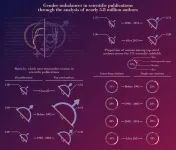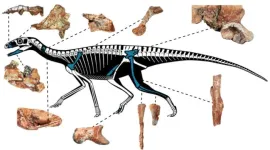(Press-News.org) A simulation study conducted by a team from the Technical University of Munich (TUM) demonstrates that a soft drink tax in Germany would have significant positive effects. In all of the simulated variants evaluated, less sugar was consumed and the rate of illness dropped. This would be a way to reduce costs to the national economy and alleviate the burden on the health care system. There is, however, a difference between taxes aimed at reducing soft drink consumption and taxes aimed at bringing about changes in product formulation.
Sugary beverages increase the risk of obesity and illnesses such as diabetes. Several countries have therefore introduced taxes on soft drinks. In Germany there has been a voluntary commitment on the part of the beverage industry to reduce the sugar content of soft drinks since 2018. In early 2023, a study with the participation of Michael Laxy, Professor of Public Health and Prevention at TUM, showed that the impacts fall significantly short of the expected effects.
A team led by Michael Laxy and the University of Liverpool’s Chris Kypridemos has now reported its calculations on the effects of introducing a tax in Germany. The study is published in PLOS Medicine. “We were interested in both the short-term and long-term consequences. Therefore, we simulated the effects of the most common international taxation strategies for the time period from 2023 to 2043,” says Michael Laxy. Existing soft drink taxes can be roughly classified in one of two groups. In the United Kingdom, for example, companies have to pay levies tiered according to the volume of sugar in their soft drink formulas. In Mexico, however, the tax is added to all soft drinks independent from their sugar content. The results from international studies show that the latter variant primarily leads to a reduction in the demand for soft drinks, while the first variant is also associated with a change in formulas, meaning less sugar in soft drinks.
Per capita consumption of sugar reduced
According to the simulation, a flat-rate 20 percent surcharge on soft drink prices would reduce daily sugar consumption by one gram per person. Looking at men between 30 and 49 years of age only, the amount would even be almost three grams. The impact of a 30 percent reduction of sugar in beverage formulas, as was observed in the United Kingdom after the introduction of a tiered levy, would have even more pronounced effects. Less sugar in beverages would reduce daily per capita consumption in Germany by 2.3 grams, or by 6.1 grams for men between 30 and 49.
The team's model simulates the situation in Germany for the period examined, using data on individual nutrition, on illnesses like diabetes, on health-related risk factors and official population statistics. People under 30 were not included in the simulations, since most of the modelled diseases occur predominantly in the second half of life. "However, we know from national and international studies that soft drink consumption is highest among teenagers," says lead author Karl Emmert-Fees. “Accordingly, the average reduction of sugar consumption would be more pronounced and the positive health effects even higher if we were to include younger people.”
Less illness
“A reduction in the consumption of sugar by only a few grams a day may not seem like much, given that the statistical daily sugar consumption in Germany is about 95 gram per capita. The World Health Organization and the German Nutrition Society (DGE) recommend that a maximum of ten percent of energy requirements should be covered by sugar, corresponding to approximately 50 gram per person and day,” says Michael Laxy. “However, we have to keep in mind that consumption of soft drinks varies widely across the general population. Some people drink them in large quantities, while others never drink them. The reduction in sugar consumption would be correspondingly higher for those people who consume large volumes of soft drinks.”
When it comes to health effects, the models make quite a clear statement: In both taxation models there were significantly fewer cases of obesity, type 2 diabetes and cardiovascular disease. “The figures for type 2 diabetes are particularly impressive,” says Karl Emmert-Fees. “According to our models, over the next 20 years taxation would result in as many as 244,100 fewer people becoming ill with type 2 diabetes later or not at all.”
Savings of approximately 16 billion euros
According to the researchers, the positive impacts would also manifest themselves as financial savings: A tax on sugary drinks would mean less treatment of patients. Costs resulting from sick leave, inability to work and similar factors would also be reduced. The team determined national economic savings of approximately 16 billion euros for the simulated period with a tiered tax, of which about 4 billion euros is accounted for by health-care costs. A 20-percent flat-rate tax would still result in a total of about 9.5 billion euros.
Contribution to policy debate
According to the results of the simulation, which the team was able to replicate using a second model, a tiered manufacturer's levy would have stronger positive impact than a flat-rate tax. “Politicians will have to decide whether or not taxation of soft drinks would be practical for Germany,” says Michael Laxy. “We want to present objective arguments for this debate. Our study shows that a tax on sugary beverages is a relevant measure for the prevention of overweight, diabetes and heart disease. Approaches such as information campaigns are justified, but are not sufficient and can only be one component of an effective overall strategy.”
Publication:
Emmert-Fees KMF, Amies-Cull B, Wawro, N, Linseisen J, Staudigel M, Peters A, et al. (2023). "Projected health and economic impacts of sugarsweetened beverage taxation in Germany: A crossvalidation modelling study". PLoS Med 20(11): e1004311. https://doi.org/10.1371/journal.pmed.1004311
Further information:
Earlier study on effectiveness of Germany's current policy of a voluntary commitment on the part of the beverage industry to reduce the sugar content
Researchers at TUM collaborated in the study with Prof. Peter Scarborough of the University of Oxford and Dr. Chris Kypridemos, an expert on dynamic stochastic micro-simulations at the University of Liverpool. This kind of model enables prediction of health-related and economic developments in societies. They are referred to as micro-simulations because they can represent entire societal groups and the most probable future developments based on a large amount of data at the individual level. This means that it is possible to simulate individuals with realistic characteristics, for example with regard to demographics, nutrition and illnesses, instead of simulating aggregated groups. These models are very data-hungry and are based on a large number of parameters calculated from a variety of data sources.
Further important results of the study
For the period modeled, both variants would result in an increase in Quality-Adjusted Life Years (QALYs), an indicator from health economics, that combines effects on life expectancy and quality of life. With the 20-percent tax this would be 106,000 additional QALYs, and 192,300 with the tiered tax for companies.
The two variants could reduce the number of deaths in the period modeled or at least postpone them (regardless of the cause of death). The same figure with the 20-percent tax would be 17,000, with 29,300 for the tiered corporate tax. Important to this figure is however that "prevented" and "delayed" are not modelled in isolation from one another.
For the period modelled, both variants would lead to a gain in avoided or postponed case-years of type 2 diabetes: 1,109,300 (20 percent tax) and 1,940,900 (tiered corporate tax). The limitations cited above apply here as well.
Subject matter expert:
Prof. Michael Laxy
Technical University of Munich
Professorship of Public Health and Prevention
Tel: +49 (89) 289 - 24977
michael.laxy@tum.de
TUM Corporate Communications Center contact:
Paul Hellmich
Media relations
Tel. +49 89 289 22731
presse@tum.de
www.tum.de
END
Germany: Sugar tax could save as much as 16 billion euros
Simulation study shows that soft drink taxation would be a relevant way of preventing diseases such as diabetes
2023-11-21
ELSE PRESS RELEASES FROM THIS DATE:
Most-cited scientists: still mostly men, but the gender gap is closing
2023-11-21
An analysis of 5.8 million authors across all scientific disciplines shows that the gender gap is closing, but there is still a long distance to go. The new research by John Ioannidis of the Meta-Research Innovation Center at Stanford (METRICs) at Stanford University, US, and colleagues, publishes November 21st in the open access journal PLOS Biology.
There is a strong gender gap in science which manifests itself in many ways. One of the most prominent ones is the relative representation of men and women among the scientists whose work receive the most attention in the ...
New fossil assemblage highlights complexity of classifying silesaurid phylogeny
2023-11-21
A set of fossils recovered in Rio Grande do Sul, Brazil’s southernmost state, has brought an extra layer of complexity to the study of the evolutionary history of silesaurids, a family of dinosauriforms (dinosaurs and their close relatives) that lived in the Triassic period between 247 million and 208 million years ago.
In an article published in the Journal of Vertebrate Paleontology, researchers affiliated with institutions in Brazil and the United States show that even with the new fossil assemblage ...
CRF launches Scientific Excellence Top 10 (SET-10)
2023-11-21
NEW YORK – November 20, 2023 – The Cardiovascular Research Foundation (CRF), in conjunction with the Transcatheter Cardiovascular Therapeutics (TCT) 2023 conference, CRF's annual scientific symposium, announced today the launch of the CRF Scientific Excellence Top 10 (SET-10), a new global annual ranking recognizing academic contributions to interventional cardiovascular medicine.
The SET-10 initiative, aligning with CRF's commitment to advancing the field, aims to recognize and celebrate the extraordinary contributions made by medical and academic ...
Cleveland Clinic research finds sex differences in immune response and metabolism drive Alzheimer’s disease
2023-11-21
Tuesday, Nov. 21, 2023, CLEVELAND: Cleveland Clinic researchers analyzed genes and brain tissue of patients with Alzheimer’s and found that differences in brain immunometabolism – the interactions between the immune system and the ways cells create energy – may contribute to women’s increased risk for the disease and its severity.
The findings, published in Alzheimer’s and Dementia, offer important insight into developing sex-specific treatment and prevention options for Alzheimer’s disease, the sixth-leading ...
Hearing loss is associated with subtle changes in the brain
2023-11-21
Hearing loss affects more than 60 percent of adults aged 70 and older in the United States and is known to be related to an increased risk of dementia. The reason for this association is not fully understood.
To better understand the connection, a team of University of California San Diego and Kaiser Permanente Washington Health Research Institute researchers employed hearing tests and magnetic resonance imaging (MRI) to determine whether hearing impairment is associated with differences in specific brain regions.
In the November 21, 2023 issue of the Journal of Alzheimer’s Disease, researchers reported that individuals enrolled in this observational ...
Long in the Bluetooth: Sussex scientists develop a more efficient way to transmit data between our devices
2023-11-21
University of Sussex researchers have developed a more energy-efficient alternative to transmit data that could potentially replace Bluetooth in mobile phones and other tech devices. With more and more of us owning smart phones and wearable tech, researchers at the University of Sussex have found a more efficient way of connecting our devices and improving battery life. Applied to wearable devices, it could even see us unlocking doors by touch or exchanging phone numbers by shaking hands.
Professor Robert Prance and Professor Daniel ...
Discovering communications mechanisms between cells
2023-11-21
Day by day, we communicate with our office colleagues to accomplish tasks that are necessary to function. The more than 200 different types of cells in our bodies do the same thing, but the way they communicate with each other isn't as simple as sending an email.
Researchers like Ioannis Zervantonakis are still trying to understand how these cells actually communicate with each other. The assistant professor of bioengineering at the University of Pittsburgh Swanson School of Engineering recently received a National Institute of General Medical Sciences Maximizing Investigators' Research Award, and his project ...
Digital payment platforms can easily be misused for drug dealing
2023-11-21
Digital payment platforms such as Venmo work great for sharing a dinner bill with friends, buying gifts at a pop-up shop or making payments without cash or credit cards.
But these digital payment platforms have a dark side: They can be misused for drug dealing and other illicit activity, suggest researchers from the University of California, Davis. And social media apps such as TikTok and Instagram can act as marketing tools for digital drug dealing.
“While platforms like Venmo revolutionize financial interactions, they also highlight the need for ongoing vigilance and adaptive regulatory measures,” said Pantelis ...
Deep-sea mining and warming trigger stress in a midwater jellyfish
2023-11-21
The deep sea is home to one of the world's largest communities of animals about which we still know very little. Yet it is already subject to a growing number of human-induced environmental pressures. How do its inhabitants respond to these stressors? A new study led by researchers from the GEOMAR Helmholtz Centre for Ocean Research Kiel, published today in the scientific journal Nature Communications, provides first insights into the stress response of a deep pelagic jellyfish to ocean warming and deep-sea mining induced sediment plumes.
One particular and potentially large environmental stressor for organisms in the deep ocean is the environmental ...
Gender prize gap in science exists as only one in eight female academics win awards named after men
2023-11-21
Female academics are significantly underrepresented in winning academic prizes and having awards named after them, a new study shows.
Analysis of nearly 9,000 awardees and 346 scientific prizes and medals published today (Tuesday 21 November) in Nature Human Behaviour has found that men win eight prizes for every one won by a woman if the award is named after a man. These awards represent almost two thirds of all scientific prizes.
Female academics are however more likely to win awards that have been named after other notable female scientists, with 47% of those awards going to women and 53% to men.
Dr Katja Gehmlich, Associate Professor in the Institute ...
LAST 30 PRESS RELEASES:
Family relationships identified in Stone Age graves on Gotland
Effectiveness of exercise to ease osteoarthritis symptoms likely minimal and transient
Cost of copper must rise double to meet basic copper needs
A gel for wounds that won’t heal
Iron, carbon, and the art of toxic cleanup
Organic soil amendments work together to help sandy soils hold water longer, study finds
Hidden carbon in mangrove soils may play a larger role in climate regulation than previously thought
Weight-loss wonder pills prompt scrutiny of key ingredient
Nonprofit leader Diane Dodge to receive 2026 Penn Nursing Renfield Foundation Award for Global Women’s Health
Maternal smoking during pregnancy may be linked to higher blood pressure in children, NIH study finds
New Lund model aims to shorten the path to life-saving cell and gene therapies
Researchers create ultra-stretchable, liquid-repellent materials via laser ablation
Combining AI with OCT shows potential for detecting lipid-rich plaques in coronary arteries
SeaCast revolutionizes Mediterranean Sea forecasting with AI-powered speed and accuracy
JMIR Publications’ JMIR Bioinformatics and Biotechnology invites submissions on Bridging Data, AI, and Innovation to Transform Health
Honey bees navigate more precisely than previously thought
Air pollution may directly contribute to Alzheimer’s disease
Study finds early imaging after pediatric UTIs may do more harm than good
UC San Diego Health joins national research for maternal-fetal care
New biomarker predicts chemotherapy response in triple-negative breast cancer
Treatment algorithms featured in Brain Trauma Foundation’s update of guidelines for care of patients with penetrating traumatic brain injury
Over 40% of musicians experience tinnitus; hearing loss and hyperacusis also significantly elevated
Artificial intelligence predicts colorectal cancer risk in ulcerative colitis patients
Mayo Clinic installs first magnetic nanoparticle hyperthermia system for cancer research in the US
Calibr-Skaggs and Kainomyx launch collaboration to pioneer novel malaria treatments
JAX-NYSCF Collaborative and GSK announce collaboration to advance translational models for neurodegenerative disease research
Classifying pediatric brain tumors by liquid biopsy using artificial intelligence
Insilico Medicine initiates AI driven collaboration with leading global cancer center to identify novel targets for gastroesophageal cancers
Immunotherapy plus chemotherapy before surgery shows promise for pancreatic cancer
A “smart fluid” you can reconfigure with temperature
[Press-News.org] Germany: Sugar tax could save as much as 16 billion eurosSimulation study shows that soft drink taxation would be a relevant way of preventing diseases such as diabetes



